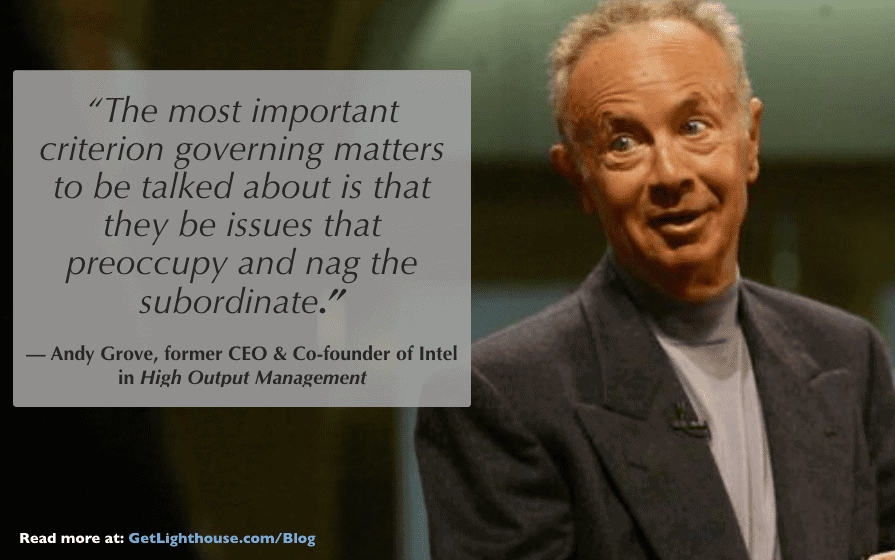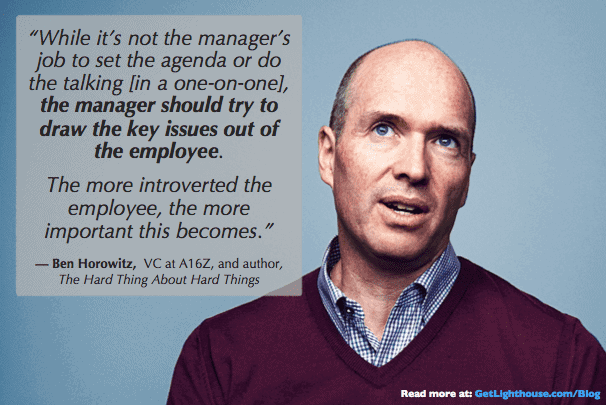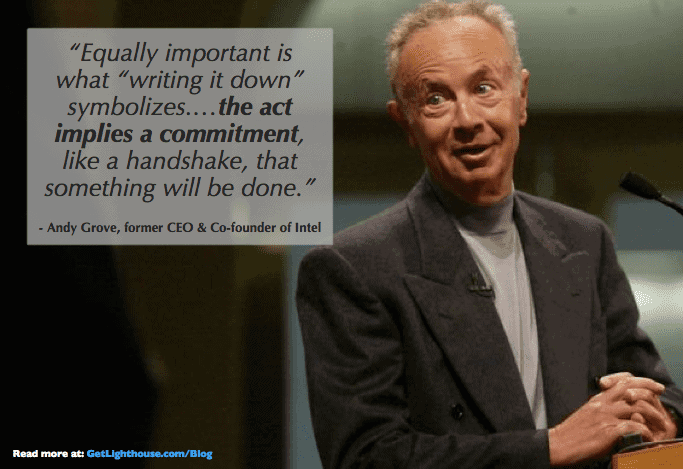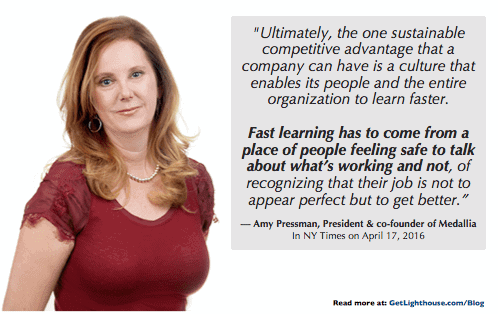Are you making the most of your one on one meetings?
One on ones are a vital tool for not only keeping your team happy and motivated, but solving issues that may be holding team members back.
And yet, many managers struggle with one on ones and don't know what to do to fix them.
Sometimes fixing your one on ones is as simple as asking some fresh questions, or making sure you have a foundation of trust and rapport before you talk about heavier topics.
Other times, you have to dig deeper and look at the overall structure of your meetings to understand why they're not going as well as you hoped.
If you want to maximize the time you invest in each of your team members, you need to make sure you have great one on one meetings. And you do that with an effective one on one meeting agenda.
Table of Contents
Read on or jump to the section that most interests you to learn more about making a great one to one meeting agenda by clicking on the table of contents below:
- Why effective 1 on 1s are so important
- Why you need a 1 on 1 meeting agenda
- How to make your 1 on 1 meeting agenda great
- Further reading so you can learn more

Why effective one on ones are so important
Whether you've just started having regular one on ones with your team, or you've used them for a while as an important part of your management strategy, the benefits can be huge.
These benefits of having regular, quality one on ones with your team include:
- Your employees will be (a lot) more engaged: Research by Gallup found that employees who have regular one on ones with their managers are almost 3x more engaged than those who don't.
- You'll reduce turnover: People leave managers, not companies. Adobe achieved a 30% reduction in turnover by implementing regular one on ones.
- Your employees will become more productive: It's well-known among high-level leaders that one on ones are critical for working through employee issues and overcoming blocks. GE implemented regular one on ones to their management strategy and saw a 5x productivity increase in just 1 year.
[Ed note: Learn more about the value of one on ones here: The Quantified Value of 1:1 Meetings and How to Make the Most of Them.]
However, you can only obtain these benefits from your one on ones, if they're done right. You can't wing it and get the same results as those who are well prepared.
You have to be intentional with how you approach your one on ones. And a one on one agenda can help you immensely with that.
Why You Need a One on One Meeting Agenda
You might feel that your one on ones are already pretty effective. However, by adding an one to one agenda, you can greatly enhance the meeting and make the most of the 30-60 minutes you have for each of your team members. Here's why:
1) Really make it their meeting
Times change and so do people. There are always new challenges, issues, problems, and opportunities that come up that you have to help your team with.
It's why you have your one on ones in the first place: to stay on top of these issues that don't neatly fit into their daily tasks. As Andy Grove, former CEO of Intel wrote on one on one meetings:

While many of you may know this, it's still really easy to let some important topics slip in your one on ones.
Maybe something happened to them last Monday and so it's no longer on top of their mind in your one on one this week. Maybe you had something you wanted to talk about, but you would have waited to discuss it if you had known what was pressing for them.
If you have your team member work on an agenda of what they want to talk about leading up to each one on one, you can ensure you don't miss any critical issues that you should make sure fit into your one on one with them.
If you hear something from them that would be great to dive into your 1 on 1, ask them to put it on their one on one agenda so you can make plenty of time to talk about it.
2) Maintain trust and keep them efficient
Meetings and management go hand in hand, so it's really easy to get buried alive in them. As you run from meeting to meeting, you could easily sit down in your one on ones and have no idea what you discussed last time.
At the least, this sets you back in the meeting as you'll spend the first 5 to 10 minutes jogging your memory. At worst, your team member will resent it; they'll be less likely to open up to you, because they will feel like you won't remember what's important to them anyway.

By always having prepared a one on one meeting agenda, you can ensure that you sit down knowing what you'll be covering with each of your team members. If you add to that glancing over what you talked about last time, you'll make the most of your meetings by hitting the ground running when you start them.
3) Build momentum and continuity across one on ones
One of the challenges with one on ones is that they happen infrequently. If you're meeting with people to talk for 30-60 minutes every few weeks, it's pretty easy for each one to be an isolated conversation.
However, if you want to build valuable momentum from meeting to meeting, reviewing your notes and having an agenda each time can be a big boost. This will also help ensure you can cover a variety of important topics, like their career goals, feedback, praise, and shopping ideas/getting buy in.
One on ones become much more powerful when there's continuity from one meeting to the next. Whether you ran out of time on a subject and need to push it to next meeting, or have something you don't want to forget to check in on, a one to one agenda ensures neither of you will forget.
It also avoids wasting a one on one on small talk, when you could have covered something more important that keeps them happy and motivated.

How to Make Your One on One Meeting Agenda Great
Now that you can see why preparing a one on one agenda is important, let's take a look at how to create a great one on one meeting agenda:

1) Make sure they contribute to the one on one agenda
This is their meeting so it only makes sense to ask them to take the lead on creating the agenda. You don't need anything fancy, just ask them to send you a simple outline of whatever is on their mind that they want to discuss.
Encourage them to "add it to the agenda" if they come to you mid-week with something they would like to discuss and you can't handle it in the moment.
Then, as your one on one approaches, ask for it in advance of the meeting so you have a chance to review it, ask for any clarifications, and be in the right mindset in the meeting. Most managers will ask for it either the day before or the morning of the one on one at the latest.
[Ed. note: If your team member is brand new to one on ones, this post can help them understand what to expect and what are good things to bring up with you in the meeting.

2) Add your own questions and topics
While one on ones are their meeting, you play an important role. You still need to do your part to prepare and especially bring good questions.
While your team will build the habit of bringing pressing issues to you by adding them to their agenda, you still have to develop the skill of probing deeper and asking good questions to leave no elephants in the room. Ben Horowitz captured this well when he wrote the above quote.
Take the time to consider what areas you haven't talked about in a while since there's a variety of topics to cover in one on one meetings.
You can also arm yourself with a variety of good questions that may help you dig in on a subject your team member brings up.

If you don't ask, you won't know.
With the right questions in hand (imagine a tool belt of questions you can pull from depending on the situation), you can dig deeper and uncover important insights during your one on ones. It will also show your team member the wide variety of topics that are safe and welcome to be discussed in their one on ones.
Further, it's vital that you know how to dig deeper and ask the hard questions when the situation calls for it. And it all comes from asking the right questions depending on your goals at the time.
Like these for building rapport and trust:
- How do you feel your work/life balance is right now?
- What's one thing we could change about work for you that would improve your personal life?
- What drives you? What motivates you to come to work each day?
These for giving and receiving feedback:
- Do you feel you're getting enough feedback? Why/why not?
- What's a recent situation you wish you handled differently? What would you change?
- What aspect of your job you would like more help or coaching?
Or these for improving your team and the company as a whole:
- If you were CEO, what's the first thing you'd change?
- What are your favorite parts about our culture?
- Do you feel over-worked, under-worked, or just the right workload?
You can keep track of all of these questions and get more ideas in our free 1:1 meeting template.

What question, or questions, you use should depend on what's most important at the time. For example, if the employee is new, build rapport, as that's foundational to a health working relationship. Meanwhile, if they seem frustrated, asking for feedback is a great way to draw out what may be bothering them.
Whether pre-planned or used on the fly to dig into an issue an employee brings up, with a variety of one on one questions in hand, you'll have what you need to accomplish any goal in your 1 on 1s.
The best leaders are prepared. To be like them you should take time to add a few questions to your one on one agenda based on what you think is most important right now for this team member.
[Ed. Note: For more great one on one meeting questions, read 132 One on One Meeting Questions Great Managers Use to Create High Performing Teams.]

3) Avoid status updates
Repeat after me: "one on one meetings are not status updates."
It's a massive waste of you and your team member's time to spend a one on one on basic project and task management when there's no other time to cover bigger issues like their career development, interpersonal issues, constructive feedback, etc.
If they're looking for coaching or help on a blocker, that's okay, but you should never have agenda items for things like:
- What they accomplished last week
- What they're doing this week, and
- What they are doing next week.
Save that for team-wide stand-ups and tools like Basecamp and IDoneThis.
If your team member does put status items on their one to one agenda, try to cover all those before the meeting. Then you can spend the actual one on one on more valuable topics.
Remember: Your actions as manager set the tone and expectations, so if you don't allow the meeting to become a status update, they won't let it either.
If you're still tempted to have status updates in your one on ones, or need to convince a friend or colleague to change, check out these in depth posts:
- Why status updates are a bad idea
- How to Get Status Updates Out of Your 1 on 1s (and what to focus on instead)

4) Set a deadline for both of you
There's always more work to be done than anyone has time, so it's easy to procrastinate on an agenda or just flat out forget to make one. That's why setting a deadline to receive their agenda and for you to make yours matters.
Tell them a set time before the one on one that you want to receive it by. This will help you prepare and ensure they have a deadline to get something to you.
When setting the deadline, choose a time that gives you room to prepare; most night-owl managers I know ask for it the day before, while morning people will be fine with receiving it first thing in the morning of the one on one.
Especially when you start out asking for a one on one meeting agenda, you may need to remind them.
You can do this by setting a calendar invite you share for the time you want it by, using an email reminder tool like Followup.cc or Boomerang to send a reminder back to both your inboxes.
At the same time, do your part to lead by example, and send them topics in advance, too.
Especially for your introverts, they'll want some time to think about what you want to ask, as opposed to being put on the spot. That means a good one on one agenda is even more important for those team members.

5) Put their items on the one-on-one meeting agenda first
While you both may have topics you want to cover in their one on one, to reinforce that it's their meeting, go over their items first.
This can also save you in a big way: they may tell you something that completely changes your priorities for the rest of the meeting or how you approach what you discuss.
Here are two simple examples:
Death or family emergency
If it turns out something bad has happened in their personal life, work becomes a lot less important.
That career discussion you had planned, or follow up on a minor question last week, suddenly can wait when instead you need to talk about how they're handling that situation and how it affects their work.
Unexpected context
I had a team member once who had made a very poor hire we had just let go. I had prepared to go over what went wrong with them as it was clear they didn't follow our standard hiring process when bringing the person onboard.
However, before I could dive in, I found out how overwhelmed they were feeling. The discussion quickly shifted, focusing first on relieving the bigger problem of managing their workload.
The feedback I received worked out even better than I hoped because I was able to re-frame our discussion around how the process they had forgotten would actually save them time instead of just being critical.
If you've ever felt like you stuck your foot in your mouth as a manager, you know how important context is. By knowing what they want to talk about before the meeting, you can avoid difficult or awkward situations.

Use an agenda for one on one meetings to improve your relationships with your team
One on one meeting agendas can turbo charge your one on ones and let your team know that the meetings are truly an open forum for them.
While the meeting itself can be fluid and open-ended, having a little structure can help you maximize the time you invest in each meeting. And that, in turn, shows them that you value your team members, and the thoughts, ideas, and needs they have.
How to easily implement agendas to add more structure to every 1:1
Creating agendas for your 1:1 meetings can give them an immediate boost and help your team members’ be more motivated and engaged at work. To make the most of agendas, implement the tips we've mentioned today:
- Make sure your team members contribute to the one to one agenda
- Add your own topics and questions
- Avoid status updates that could have been an email or in a project app
- Set clear deadlines to make items from one on one agendas actionable
- Put their items first and address their concerns
Want to keep learning? Learn more about having great 1 on 1s below...
- Start by reading our helpful 1:1 meeting template.
- If you're new to 1 on 1s, also read: What to Expect In Your First One on One Meetings with an Employee and learn step by step how to start 1 on 1s with your team
- More advanced as a leader? Explore the question: Who really owns a 1 on 1 meeting? It's not so simple.
- Plus, learn how your 1 on 1s should change and adapt over time: How to Evolve Your 1-on-1s Over Time for Maximum Value
- Want to really go deep? We have a quick checklist you can download and grab for your next 1 on 1: 30 One on One Meeting Tips for Effective One on Ones or you can reference our 130+ One on One Meeting Questions Great Managers Ask
Are you and your managers wasting their 1 on 1s?
There is no greater investment to make in your team than having 1 on 1s. Yet, done poorly they’re a huge waste of time.
That’s why we made the 1 on 1 Master Class. You and your fellow managers learn step by step how to supercharge these meetings to motivate your teams, fix problems, coach your people, and much more.
You can learn how Lighthouse Lessons can help your leaders like we helped SeedBox Technologies by signing up here.

What should be the agenda for one on one meeting?

Having a one on one meeting agenda is a critical part of making the most of your 1 on 1s with your team or manager. In these agendas you should include:
- Questions either person has for the other
- Career progress or what career growth the team member would like
- Ideas or feedback to improve your relationship, your team, or the company
- Important updates the other person needs to know, whether they're personal or professional
And much more. Yet, the one thing that should *not* be in the meeting is just as important: never give or ask for status updates in your 1 on 1s. Get those another way.
Learn more about the do's and don'ts of having a great agenda for one on one meetings here.




